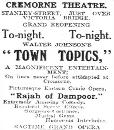AustLit
BiographyHistory
Most Referenced Works
Notes
-
1. HISTORICAL NOTES AND CORRECTIONS:
1.1. Elton Black and Billy Maloney had previously worked together in the Elton Black-Kate Howarde Revue Company (ca. 1915-1916).
-
2. TOWN TOPICS PERSONNEL:
All dates shown below are established years only. In some instances, people may have been associated with the company prior to or after the dates shown but these years have not yet been identified.
2.1. Principal troupe members were Charles Albert (1920-1921), Rene Albert (1920), Arthur Aldridge (1920-1921), Mollie Asher (1919-1921), Irene Barlee (1919), Jessie Barlee (1919), Alice Bennetto (1919-1921), Elton Black (1919-1921), Fred Bluett (1921-1922), Gus Bluett (1921-1922), Colin Crane (1921-1922), Dulcie Crane (1921-1922), Miss de Warren (1920), Nell Fleming (1920-1922), Carl Formes (1920-1921), Yorke Gray (1919-1920), Miss Grey (1920), Howard Hall (1920-1921), Reg Hewett (1919), Leslie Jeffcott (1919-1920), Carmel Jeffery (1919-1921), Walter Johnson (1919-1920), Glenmore Jones (1920), Sydney Jones (1919-1921), Jean Keith (1920-1921), Mr Kennedy (1919), Miss Lareen (1920), Dorothy Leigh (1919), Claire Lloyd (1920-1921), Percy McKay (1919-1920), Nelle McCarthy (1921), Gladys McDowell (1919), Billy Maloney (1920-1922), Ida Merton (1921), Belle Millette (1919-1920), Olga Muir (1919-1922), Marie Ney (1920), Rita Nelson (1919), Myrtle Power (1920-1921), Gladys Raines (1920-1921), Fred Reade (1920-1921), Phyllis Rose (1920), Lou Vernon (1919-1921), George Whitehead (1920).
2.2. Production team/musicians included Selwyn Armstrong (scenic artist ca. 1920-1923), Marjorie Bray (choreographer, ca. 1921), Elton Black (director ca. 1920-1921), Mary Glynn (costumes, ca. 1921), Victor Gouriet (director, 1921 - Bran Pie), Robert Grieg (director, 1922), Miss Hair (costumes, 1921-1922), Reg Hewitt (properties, 1921-1922), Walter Johnson (director, 1919-1920), Billy Maloney (director, ca. 1921-1922), W. Medway (lighting, 1921-1922), Frederick Whaite (music director, ca. 1919-1922).
-
2.3. Special guest artists included Verna Bain (1921), Little Berenice Berg (Cinderella, 1920-1921), Pauline Bindley (1923), Mr Jan. Caryil (Cinderella, 1920-1921), Frank Charlton (1921), Lottie Collins (1921-1922 - Old Woman Who Lived in a Shoe principal boy), Ray de Vere (1921-1922 - Old Woman Who Lived in a Shoe), Eloise de Vessy (violin, 1920), Mr M. Goldhill (Cinderella, 1920-1921), Victor Gouriet (1921, A Daughter of Japan), Kitty Gourley (1921), Robert Grieg (1921-1922), Clarice Hardewick (1920-1921, Cinderella principal boy), Beatrice Holloway (1921-1922), Jean Jeffery (16-year-old violinist, 1919), Keely and Aldous (Fred Keeley and Ivy Aldous, 1921), Harold Kellaway (1921), Carrie Lanceley (1920), Leslie H. MacCallum (1920), Nellie McCarthy (1921), Sylvia McLeod (1922), Amy Rochelle (1921), Madeline Rossiter (1922), Ivy Shilling (1921), Sadie Tilburn (1921), Frank R. Tozer (1921), Elsie Treweek (1921), Charles Zoli (1921).
2.4. Additional notes and/or historical clarification:
-
Ray de Vere, a specialist pantomime actress, appeared in such productions as Babes in the Woods (1915) and Bluebeard (1918).
-
Nell Fleming's Christian name is sometimes spelled 'Nelle' and 'Nellie.'
-
Fred Keeley's surname is sometimes mis-spelled in Brisbane Courier reviews (as Keiley).
-
Percy McKay's surname is sometimes spelled Mackay.
-
Belle Millette's surname is sometimes spelled 'Milette.'
-
-
3. MANUSCRIPTS AND ARCHIVAL COLLECTIONS:
3.1. The Nat Phillips Collection (Fryer Library, The University of Queensland) contains a number of 'running order sheets' for the 1919-1920 Town Topics season (Box 7).
3.2. A complete script for the dramatic sketch A Daughter of Japan, produced at the Cremorne Theatre beginning 9 September, is also held in the Nat Phillips Collection (Box 6). The production featured Howard Hall, Colin Crane, Victor Gouriet, and Nell Fleming.
-
Entries connected with this record have been sourced from on-going historical research into Australian-written music theatre and film being conducted by Dr Clay Djubal.


